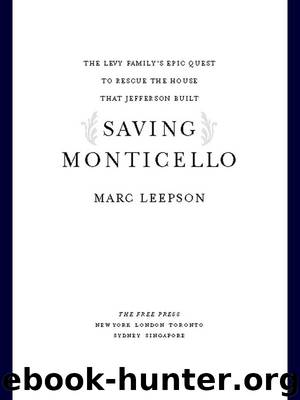Saving Monticello by Marc Leepson

Author:Marc Leepson
Language: eng
Format: epub
Publisher: Simon & Schuster
Published: 2001-07-15T00:00:00+00:00
AT TWO o’clock on the afternoon of Tuesday, July 9, 1912, the thermometer outside the U.S. Capitol in Washington registered 110 degrees. Moments before, a taxicab pulled up to the Senate side of the Hill. Maud Littleton stepped out, alone, and walked through the stuffy corridors of the Senate to the small room where the Senate Committee on the Library was about to hold a hearing called “Public Ownership of Monticello.”
She was clad, the Washington Herald reported the next day, “in a white fluffy lace dress, a black hat and white slippers.” Armed with a long prepared speech and with a large stack of letters she had received in response to her “One Wish” mailing, Mrs. Littleton faced a friendly group of senators.
“I feel a trifie nervous,” she said as she prepared to give her testimony. Her nervousness vanished as she launched her blistering, all-out attack on Jefferson Levy’s ownership. She began, as was her pattern, by reminding the senators that there was no memorial to Thomas Jefferson in Washington, and by singing his praises and extolling Monticello. Mrs. Littleton also praised John Augustine Washington and the descendants of Robert E. Lee and Andrew Jackson for “patriotically surrendering their historic houses as national memorials.”
Mrs. Littleton expressed indignation that Monticello was in private hands. “It is not a pleasant thing to be obliged to go upon private property to pay a visit to the tomb of Jefferson,” she said. Characterizing Monticello as a “poor, neglected, forsaken home,” Mrs. Littleton accused Jefferson Levy of making it a memorial to Uriah Levy.
She then offered her version of the “complete history” of Monticello, going back to 1735 when Peter Jefferson gained title to the land. When she got to Uriah Levy’s 1834 purchase, Mrs. Littleton repeated the unsubstantiated story that had Uriah Levy stealing Monticello from another buyer.
Mrs. Littleton then reviewed, in laborious detail, Uriah Levy’s will, the congressional debate over whether to accept the bequest, and the executors’ lawsuit. She again said that the New York Supreme Court decision voiding the will was based on “the technical ground of ‘indefiniteness. ’” That technicality, she said, meant that “Uriah Levy’s wish, which was solemnly written in his will,” that Monticello be used as a school for the orphans of Navy warrant officers, “must go for nothing.” Worse, she said, was the ultimate outcome: “that Monticello came into the possession of Jefferson M. Levy, instead of the people of the United States, to whom it had been left in trust.”
She repeated, in detail, the story of Uriah Levy’s gift of the David d’Angers Jefferson statue and the forty-year wait before Congress officially accepted it. She quoted from a Jefferson Levy–friendly (and probably Levy-written) biography in the 1892 edition of the National Cyclopaedia of American Biography in which Jefferson Levy was identified as Thomas Jefferson’s grandson.
“This is not true,” Mrs. Littleton said. “J. M. Levy is not the grandson and he did not inherit Monticello. These mistakes have always done so much harm, and it is a good thing to have them straightened out.
Download
This site does not store any files on its server. We only index and link to content provided by other sites. Please contact the content providers to delete copyright contents if any and email us, we'll remove relevant links or contents immediately.
Kathy Andrews Collection by Kathy Andrews(10506)
The remains of the day by Kazuo Ishiguro(7542)
Spare by Prince Harry The Duke of Sussex(4188)
Paper Towns by Green John(4163)
The Body: A Guide for Occupants by Bill Bryson(3789)
Be in a Treehouse by Pete Nelson(3206)
Harry Potter and the Goblet Of Fire by J.K. Rowling(3025)
Goodbye Paradise(2949)
Never by Ken Follett(2872)
Into Thin Air by Jon Krakauer(2695)
The Remains of the Day by Kazuo Ishiguro(2614)
The Genius of Japanese Carpentry by Azby Brown(2602)
The Cellar by Natasha Preston(2592)
Drawing Shortcuts: Developing Quick Drawing Skills Using Today's Technology by Leggitt Jim(2528)
120 Days of Sodom by Marquis de Sade(2428)
Architecture 101 by Nicole Bridge(2348)
The Man Who Died Twice by Richard Osman(2289)
Machine Learning at Scale with H2O by Gregory Keys | David Whiting(2264)
Fairy Tale by Stephen King(2058)
